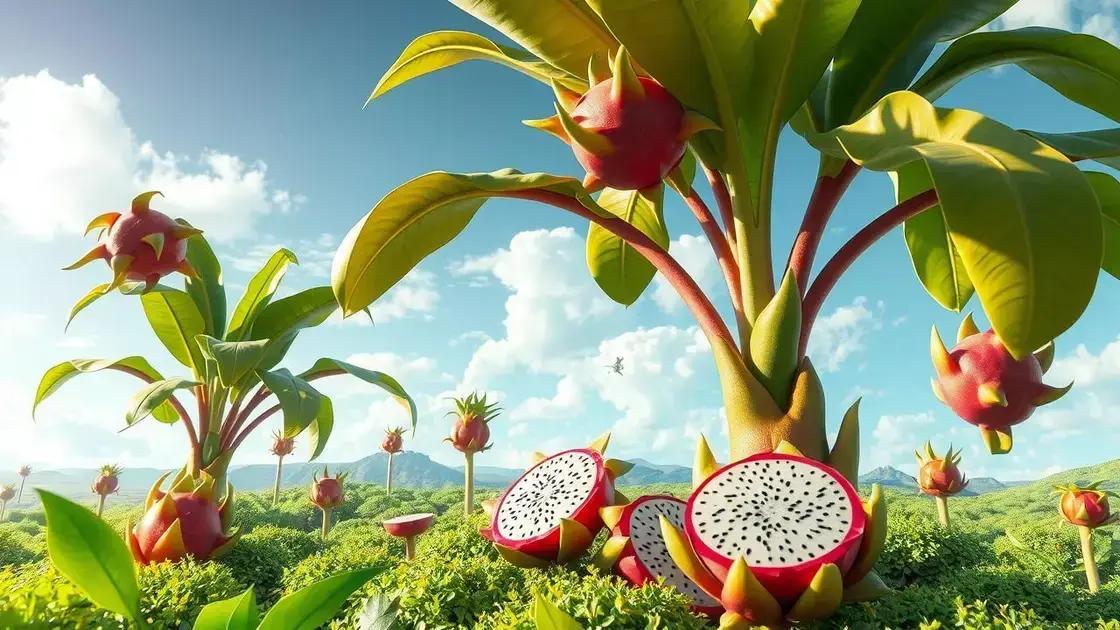How to Care for a Dragon Fruit Plant: 7 Essential Tips for Success
How to care for a dragon fruit plant can seem daunting, but understanding a few key elements can make it easy. These stunning plants not only produce delicious fruit but also add a tropical flair to your garden. Curious about how to help your dragon fruit flourish? Let’s dive into the essential tips for maintaining this unique plant.
Table of Contents
ToggleUnderstanding dragon fruit plant requirements
Understanding dragon fruit plant requirements is essential for cultivating a healthy and productive plant. These unique tropical plants have specific needs for sunlight, soil, watering, and nutrients that must be met to thrive. In this section, we will explore each of these requirements to help you achieve success in your dragon fruit gardening.
Sunlight requirements for dragon fruit plants
Dragon fruit plants love sunlight! Here are some key points:
- They require at least 6 to 8 hours of direct sunlight daily.
- Ideal locations are south-facing areas with protective barriers from harsh winds.
- Indoor growers should consider using grow lights if adequate natural light is unavailable.
Soil needs for healthy growth
Proper soil is crucial for dragon fruit plant maintenance. Consider the following:
- Use well-draining soil; sandy or cactus potting mixes work best.
- The pH level should be slightly acidic to neutral (around 5.5 to 7.0).
- Incorporate organic matter, like compost, to enhance soil fertility.
Watering schedule for dragon fruit plants
Water management is vital for the wellbeing of your dragon fruit plant:
- Water deeply but infrequently, allowing the soil to dry out between waterings.
- During the growing season (spring and summer), water approximately once a week.
- Reduce watering in the fall and winter to avoid root rot.
Nutrient requirements for optimal growth
Fertilization enhances the growth and fruiting of your dragon fruit plants:
- Use a balanced fertilizer (e.g., 10-10-10) every 4 to 6 weeks.
- Organic options like compost tea or fish emulsion can also be beneficial.
- Monitor for any deficiencies, such as yellowing leaves, indicating a need for more nutrients.
For more details about enhancing your plant care, consider exploring indoor gardening techniques.
Common pests and diseases
Being aware of potential threats is crucial for maintaining your dragon fruit plant:
- Watch out for pests like mealybugs and scale insects.
- Diseases such as root rot can occur from overwatering; maintain a proper watering schedule to prevent this.
Example of successful dragon fruit growing
Many gardeners have successfully grown dragon fruit indoors by ensuring these requirements are met. Regular observation and adjustments can lead to flourishing plants and bountiful harvests.
Best soil for a thriving dragon fruit plant

Best soil for a thriving dragon fruit plant is essential for successful growth and fruit production. Choosing the right soil mixture will ensure that your dragon fruit plant receives the proper drainage and nutrients it needs to flourish. Let’s explore the optimal soil characteristics and mixtures for cultivating healthy dragon fruit.
Essential soil properties
The foundation of a successful dragon fruit planting begins with understanding the essential soil properties:
- Drainage: Excellent drainage is critical to prevent root rot.
- pH level: The ideal pH should range between 5.5 and 7.0.
- Nutrient content: A good balance of nutrients supports growth and fruiting.
Recommended soil mixtures
Here are some recommended soil mixtures that promote healthy dragon fruit growth:
- Cactus mix: This is designed for cacti and contains sand and perlite for drainage.
- Homemade mixture: Combine equal parts compost, coconut coir, and perlite.
- Commercial potting mix: Look for mixes labeled for succulents or cacti, ensuring they have added drainage.
Soil amendment options
Amendments can enhance the soil’s properties and ensure optimal growing conditions:
- Pearlite: Improves aeration and drainage.
- Coconut coir: Retains moisture while providing good drainage.
- Compost: Boosts nutrient content and soil health.
Example of successful soil setups
Many gardeners have observed improved growth using these soil combinations. For example, a mixture of cactus soil and additional organic matter often yields vibrant plants with abundant fruit.
For more guidance on mixing suitable soils for other plants, consider exploring indoor gardening techniques.
Essential watering and fertilization tips for dragon fruit care
Essential watering and fertilization tips for dragon fruit care are crucial for ensuring your plants thrive. Proper hydration and nutrient supply promote robust growth and abundant fruit production. This section will guide you through efficient watering practices and fertilization strategies tailored for dragon fruit plants.
Watering techniques for dragon fruit plants
Understanding how to water your dragon fruit properly is vital in preventing overwatering or underwatering:
- Frequency: Water once a week during the growing season (spring and summer). In the dormant months (fall and winter), reduce watering to every 2-3 weeks.
- Method: Water deeply, allowing moisture to reach the root zone. Ensure excess water drains away to avoid root rot.
- Signs of underwatering: Wilting leaves and dry soil indicate your plant needs water.
- Signs of overwatering: Yellowing leaves and soggy soil are signs to cut back on watering.
Fertilization schedule for optimal growth
Applying the right nutrients at the right time can enhance your dragon fruit’s vitality:
- Frequency: Fertilize every 4-6 weeks during the growing season.
- Type of fertilizer: Use a balanced fertilizer (10-10-10) or organic options like compost tea or worm castings.
- Application method: Mix the fertilizer into the soil or water it in to ensure even distribution throughout the root zone.
Essential nutrients for healthy dragon fruit
Knowing what your dragon fruit plants need is essential for proper fertilization:
- Nitrogen: Promotes healthy foliage growth.
- Phosphorus: Supports root development and flowering.
- Potassium: Enhances fruit quality and overall plant health.
For additional tips and techniques related to watering and care for your plants, consider exploring indoor gardening techniques.
Real-life watering and fertilization examples
Many successful dragon fruit growers note that maintaining a consistent watering schedule and using organic fertilizers has led to vibrant plants and plentiful harvests. Observing your plant’s response to these practices offers valuable insights for continuous improvement.
In conclusion
Caring for a dragon fruit plant requires attention to various critical aspects, including understanding its requirements, selecting the right soil, and implementing effective watering and fertilization techniques. By following the tips outlined in each section, you can ensure your dragon fruit thrives, producing both vibrant foliage and delicious fruit. Continuous observation and adjustments based on your plant’s response will lead to a fruitful experience. Additionally, if you’re interested in further improving your gardening practices, consider checking out these tips on enhancing your indoor garden for more insights.

